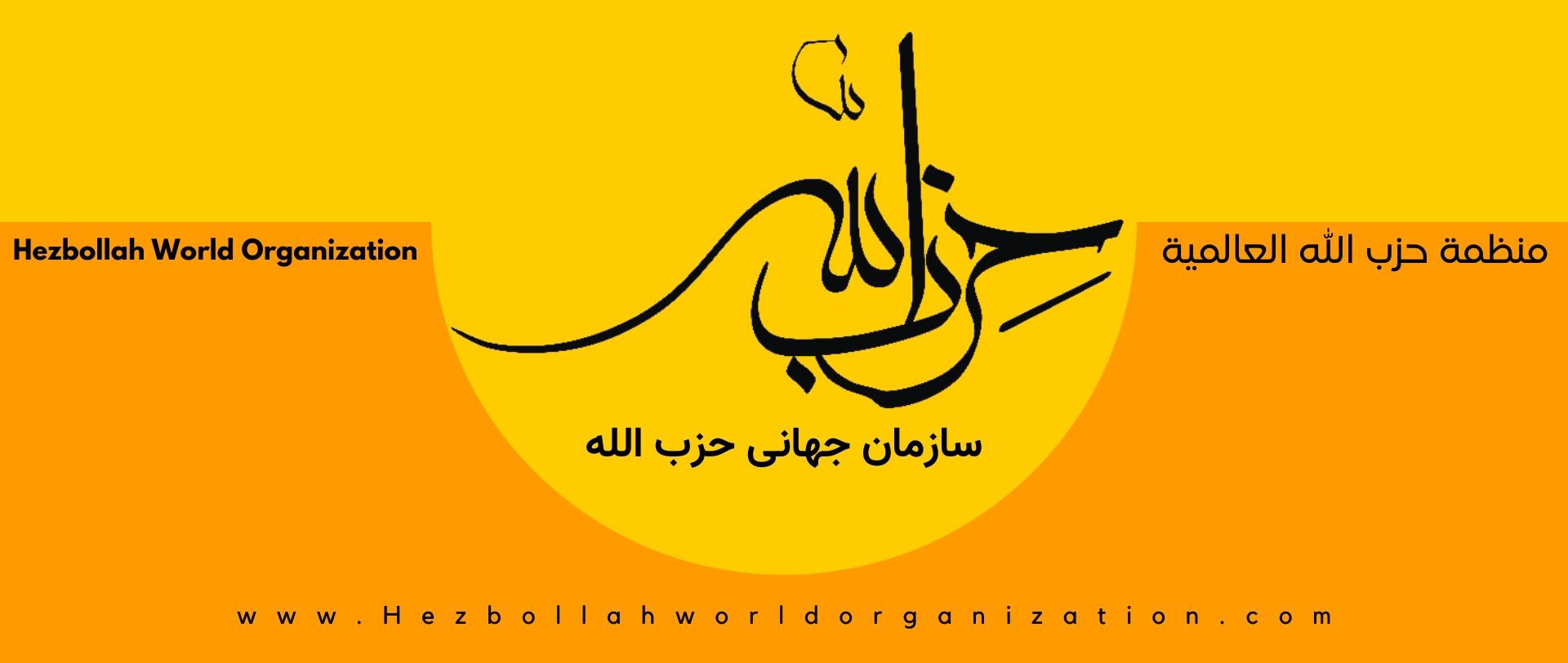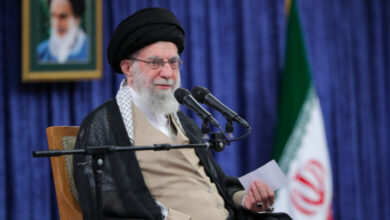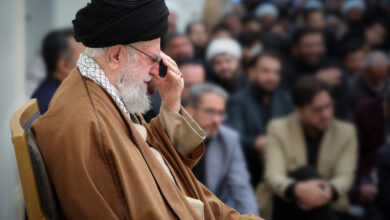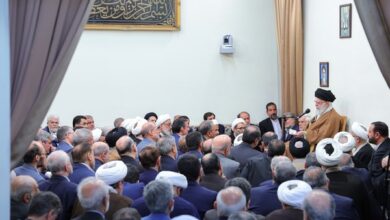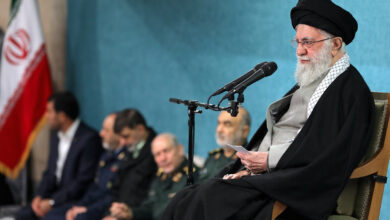Statements at a meeting of a group of commanders of the Air Force and Army Air Defense
The speech highlighted the importance of Bahman 19 and the brave move of the Army Air Force in support of the Islamic Revolution. It was also emphasized that this move gave the Iranian Army an independent and proud identity and that the army played an important role during the imposed war. The current responsibilities of the army, including strengthening manpower, equipment, and combat readiness, and the importance of self-sufficiency against foreign threats such as the United States and the Zionist regime, were discussed.
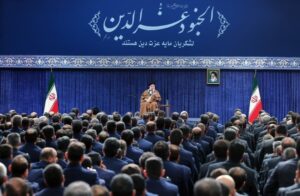
In the name of Allah, the Most Gracious, the Most Merciful
Praise be to Allah, the Lord of the Worlds, and prayers and peace be upon our master and prophet, Abu al-Qasim al-Mustafa Muhammad, and upon his pure, pure, infallible family, especially the rest of Allah on earth.
Welcome, dear brothers, to the Air Force and Defense Force of the Islamic Republic of Iran Army. Today, the blessed and glorious memory of Bahman 19, 57 is once again renewed. The importance of Bahman 19 is even greater because on this day a flag was raised, a foundation was laid that could determine the course of the new army. The Islamic Republic Army actually moved the same line that those young men came to the Alawi School that day and created that courageous epic. In fact, Bahman 19 should be known as the birth day of the new Iranian army. It could be said that the factor that was able to draw numerous individuals and prominent figures from within the army to the revolutionary field was this movement of these young people on the 19th of Bahman. There were figures within the army at various levels – from the rank and file and noncommissioned officer to higher ranks and senior officers – who were with the people, their hearts were with the revolution, but within the army, they did not have the power, opportunity, or ground to emerge; the factor that was able to draw them and place them at this high level was this courageous movement. People like Martyr Namjoo, Martyr Sayyad, Martyr Babaei, Martyr Sattari, Martyr Kolahdouz, Martyr Fallahi, and other individuals – great martyrs, some of whom are considered to be among the most famous martyrs of the Islamic Republic throughout time – came out of the army, stood in front of the eyes, and played the role of heroes. Most likely, the factor that was able to draw them into the field like this was the movement of the youth three days before the victory of the revolution; These young men, the young men of the Air Force, carried out this movement three days before the victory of the revolution in the midst of danger.
There are several characteristics that I always rely on in my conversations; although there was a characteristic in this movement. One was the “courage” of this movement; courage is very important. It is very important for a person to have the heart and courage to enter a difficult field; this movement was a courageous movement. No one knew that day that three days later, the system would be overthrown, the Pahlavi regime would be overthrown; no one knew this. All of them could have been sentenced to death; [they] showed courage.
One was the “timeliness” of this movement; some movements are very good, they are courageous, but they are not carried out at the right time. The movement of the repentant people a few years after the martyrdom of the Master of the Martyrs (peace be upon him) in Kufa was a good movement, but it was not timely; The day they should have come and helped Imam Hussein, they didn’t come; then they regretted it, they came, they took action, they were all killed, the field was also a difficult field, but what was the point? You have to enter at the right time, you have to make the move on time and in the moment. The move of these young people was on time, in the moment. What we are saying is not just to praise a group; it is because we need the same today.
Another characteristic that was present in this move and was very valuable was “being calculated and rational”; it was calculated, they had sat down, they had thought, they had worked. It was clear from the type of move that this was not an instantaneous move decided on the spot; it had been thought about, worked on, studied. It was clear; we who were witnesses to the incident understood that they had sat down and calculated this beforehand. A revolutionary movement needs this; some people think that revolutionary movements are without calculation, the opposite of rationality; this is a false idea. A revolutionary movement needs calculation and rationality more than any other movement. This is also a characteristic.
Another characteristic was that they “took advantage of the enemy’s negligence”; that is, if the counterintelligence services of that day and the high-level commanders of the royal army wanted to guess that a movement from within the army might be carried out in favor of the revolution, the last place that would come to their mind was the air force; because they reached the air force, they did not think of [their movement]. So Allah struck them from where they did not expect;(2) They were struck from where they did not expect. These brothers of ours, these young men of that day, took advantage of the enemy’s negligence and carried out this movement.
Well, this move, in the firm belief of this humble person, gave the Iranian army its identity. During that regime, the general plan was to define the Iranian army under the American military apparatus; there was no independence. Organization, American organization; weapons, American weapons; limited access to weapons with the permission of the United States; that is, they had given the F-14, but the use of the F-14 where it should be done, the United States had to allow; for example, [that] where the repair of an advanced aircraft should be done, where the replacement of a part should be done, this was not in the hands of the Iranian technical force, [it was in the hands of] the Americans. I have said many times in this meeting(3) that they would put the damaged part on the plane, take it to the United States, replace it with the correct part, and return it to Iran; they would not allow the part to be repaired here. That is, the army should really be defined under the American army and the American military organization. Important appointments, American; weapons, American; training, American; The place where this army was used was American. They didn’t even ask permission from the country’s officials. I read somewhere that Mohammad Reza says that the Americans came, took the army, and used it, and they didn’t even tell me; they didn’t ask permission, they didn’t even tell the Shah that we took this part of the army and used it. [The position of] the army was like this.
One of the objections of Imam (may Allah be pleased with him) in a speech he gave in the year 43 Kurds protesting the capitulation, that was it; that the army is insulted. (4) That is, this is what capitulation really was like. Capitulation means this: When a government, a country signs a capitulation agreement with another country, it means that if a military [person], or a figure from that government commits a crime in this country, he should not be tried here; the Americans imposed this on the monarchy of that day! These weak elements of ours, from the king to the member of the Senate, to the member of the National Assembly of that day, to prominent figures in the government like Alam and Hoveida and the like, all signed that if an American person – whoever he wanted to be – committed a crime in Iran, he should not be tried; this meant that if an American sergeant whispered in the ear of a senior Iranian officer, for example, in the ear of a colonel, that colonel who has no right to retaliate – that is, nothing – but this officer should not be tried here either; They should take him to America, have a court investigate him, and see if he did something bad or good! Is there any greater humiliation than this? The Imam protested this.
In that speech, the Imam protested against this humiliating domination of America over the Iranian army, the Iranian government, and the country of Iran. The revolution came and gave the army an identity; the army also showed its competence and became a proud and independent army. By chance, the experience of the Sacred Defense occurred and the army was present in the forefront of the Sacred Defense; it gave martyrdom, fought, and was active. I have repeatedly mentioned many memories of this case in my speeches. Today, thousands of shining stars, such as Sayyad, Babaei, Sattari, and the like, shine in the history of our country; [these] are outstanding personalities.
What should the army do today? I pose this question: What is the most important task of the army today? The answer is that today the most important task of the army is to strengthen itself; strengthening itself is the most important task of the army. The army must strengthen itself, both in terms of manpower, weapons, training, and combat readiness, defense readiness. On the day when there is no conflict, the most important task of military organizations is: to look and find the weaknesses, the gaps, the vulnerabilities that may exist in the organization as a whole, to work on these, to strengthen [themselves]; the army must strengthen itself day by day. This movement of innovation, innovative construction that has begun for several years – whether in the Ministry of Defense, the army, or the IRGC – must continue. Fortunately, our military organizations and also our military industry have proven their worth, shown that they can do great things. You can do even greater things than the great things you have done so far; The defense of the country must be the top priority of your demands, and this cannot be possible except by strengthening the military organizations. With the same spirit, with the same chivalry, with the same courage, with the same initiative and correct calculation that the 19th Bahman [Movement] taught us, you must, God willing, move forward and follow through on the work in the field of strengthening the army of the Islamic Republic.
And as for the discussion of negotiations; for how long have you been hearing in the newspapers, in cyberspace, in the speeches of this and that, the government’s negotiations? Well, what these debaters are discussing – both at home and abroad – is negotiations with America. They mention the name of negotiations, saying, “Sir! Negotiation is a good thing,” as if someone is against the good of negotiations! Today, the Ministry of Foreign Affairs of the Islamic Republic of Iran is one of the busiest foreign ministries. That is its job; they negotiate, travel, talk, and sign agreements with countries around the world – Eastern, Western, all kinds of countries; the exception that exists is America. Of course, I will not mention the Zionist regime, because it is not a government; the Zionist regime is a criminal gang that came and usurped a land, and is committing crimes; it is not the place to talk. The exception is America.
Why is it an exception? What is the reason? First of all, negotiating with America has no effect on solving the country’s problems; we must understand this correctly. Don’t pretend to us that if we sit at the negotiating table with that government, this or that problem will be solved; no, negotiating with America will not solve any problem. The reason: experience. In the 1990s, we sat down and negotiated with America for about two years – of course, America was not alone; There were a few other countries, but the axis was America, mainly America – our government that day met and negotiated, they went, came, sat, stood up, negotiated, talked, laughed, shook hands, made friends, did everything, and a treaty was formed; (5) In this treaty, the Iranian side was very generous, gave many concessions to the other side, but the Americans did not implement the same treaty; the same person who is in office now, (6) tore up this treaty; he said he would tear it up and did it; they did not implement it. Before he came, the same people with whom this treaty was made did not implement the treaty; the treaty was to lift American sanctions, [but] American sanctions were not lifted. In the case of the United Nations, they also left a bone in the wound so that it would always be there as a threat to Iran. (7) This treaty is the product of negotiations that I think took two years – more or less. Well, this is experience; let’s use this experience. We negotiated, made concessions, and made concessions, but we did not achieve the result we intended; the other side ruined, violated, and tore up this same treaty with all its flaws. One should not negotiate with such a government; negotiating is not wise, not intelligent, and not honorable.
Of course, we have problems at home; no one denies the existence of problems. There are many problems in people’s livelihoods, and almost most segments of the population have some kind of problem, but what solves these problems is the internal factor. The internal factor is the efforts of committed officials and the support of a united nation; that is, the same thing that you will see in the march, God willing: the unity of the people. The march of 22nd Bahman, every year, is the manifestation of national unity in our country. A visionary nation and tireless officials; this [factor] is what solves our problems. The officials are busy, thank God they are doing things, and I am very hopeful that this honorable government will be able to at least reduce the people’s livelihood problems and eliminate the hardships.
The Americans are sitting and changing the map of the world on paper! Of course, it is only on paper, in reality it has no reality. They also comment, talk, make statements, and threaten us; If they threaten us, we will threaten them; if they carry out this threat, we will carry out the threat; if they threaten the security of our nation, we will also threaten their security; without a doubt. This is the behavior learned from the Quran and the teachings of Islam and is a duty that is our responsibility. We hope that God Almighty will grant us success in carrying out our duties.
“And peace be upon you, and the mercy of God and His blessings.”
(1) At the beginning of this meeting – which was held on the anniversary of the historic pledge of allegiance of the Army Air Force personnel to Imam Khomeini (the Holy Shrine) on 19 Bahman 1357 – Brigadier General Hamid Vahidi (Commander of the Air Force of the Islamic Republic of Iran).
(2 Surah Al-Hashr, part of verse 2; “… But God came upon them from where they did not expect…”
(3) Including, statements at a meeting of a group of commanders and personnel of the Army Air Force, (11/19/1382)
(4 Imam’s Book, Vol. 1, p. 415; Speech to the People (8/4/1343)
(5 The agreement known as the “JCPOA”
(6 Donald Trump (President of the United States)
(7 Reference to the “Dispute Resolution Mechanism” or “Trigger Mechanism” according to which, in the event of a complaint by one of the If the parties to the JCPOA report to the United Nations that they have not implemented their commitments, all Security Council resolutions against the Islamic Republic of Iran will automatically become effective and will be binding on the organization’s member states.
